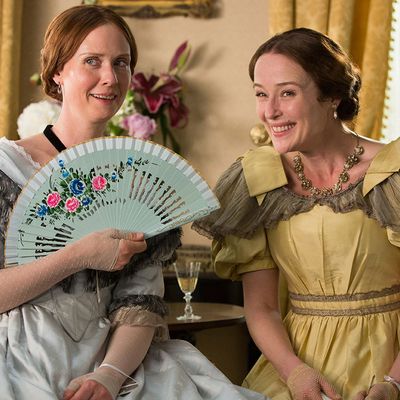
Terence Davies would seem the perfect director for an intimate portrait of Emily Dickinson. Much like Dickinson’s poems, Davies’s work has a formal dignity and rigor while containing — barely — volcanic emotion. The flesh and the spirit are continually at war, complicated by large doubts over the existence of God but little doubt that art is a means of grasping hold of eternity before death comes a-calling.
Some of A Quiet Passion fulfills that promise, but much of it is cringeworthy. Davies has decided to make Dickinson (Cynthia Nixon) and her friends and relations speak with elaborate formality, turning lines from her many extant letters into Algonquin-roundtable banter. I’m sure her conversations were stimulating, but if she’d been Dorothy Parker, I doubt she’d have shunned society so vehemently. But you don’t even need to peg the wrongness of Davies’s approach to psychology: The dialogue sticks in the ear. The worst scenes feature Dickinson’s onetime confidante (she would marry and move off) Vryling Buffam, played so archly by Catherine Bailey that the actress is hard to watch. I felt for Nixon as she tried to find a human way to respond.
Nixon manages, though, and her scenes with her sister, Vinnie, played with as much naturalism as possible by Jennifer Ehle, are warm and very fine, as they are with Keith Carradine as her stiffly pious (but loving) father. Davies’s austere framing works beautifully when Nixon is his principal object. Her face is somewhere between a little girl’s and an old woman’s, and almost pathetically open. When she laughs, it’s with her entire face. Her Emily isn’t a recluse because she doesn’t wish to speak to people. It’s because she feels herself too vulnerable, too see-through. And she can’t control her impiousness. Nixon makes you understand that Dickinson’s insistence on wearing white was to convey a virginity of the soul. It’s too bad that her voice-overs of the poems are hit-and-miss, sometimes lacking intensity. But I’m not sure any living creature could do their inner wildness full justice.
Davies doesn’t go down some obvious paths, such as the identity of the “Master” in Dickinson’s most romantic letters. (One brief scene with the leading candidate, the Reverend Wadsworth, can’t account for her ardor.) But the final scenes are potent enough to save the movie. Dickinson’s spasms are otherworldly, as if her body can no longer contain her spirit, and her eyes bulge with the horror of the nothingness to come.
*This article appears in the April 3, 2017, issue of New York Magazine.


